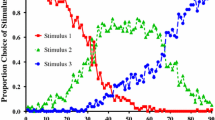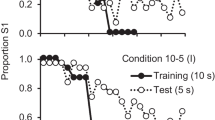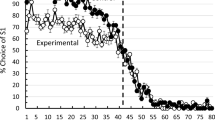Abstract
In a midsession reversal (MSR) task, animals are typically presented with a simple, simultaneous discrimination (S1+, S2−) where contingencies are reversed (S1−, S2+) half-way through each session. This paradigm creates multiple, relevant cues that can aid in maximizing overall reinforcement. Recent research has shown that pigeons show systematic anticipatory and perseverative errors across the session, which increase as a function of proximity to the reversal trial. This behavior has been theorized to indicate primary control by temporal cues across the session, instead of the cues provided by recent reinforcement history that appear to control behavior shown by humans. Rats, however, appear to be guided by recent reinforcement history when tested in an operant context, thereby demonstrating behavior that parallels that seen in humans, but they appear to be guided by temporal cues when tested in an open-field apparatus, showing behavior more akin to that seen in pigeons. We tested rhesus macaques (Macaca mulatta) on the MSR with a computerized simultaneous visual discrimination to assess whether they would show errors indicative of control by time or by recent reinforcement history. When a single reversal point occurred midsession, rhesus macaques showed no anticipation of the reversal and a similar level of perseveration to rats tested in an operant setting. Nearly identical results also were observed when the monkeys were trained with a single, variable reversal point or with multiple, variable reversal points within a session. These results indicate that temporal cues are not guiding response flexibility in rhesus macaque visual discrimination.






Similar content being viewed by others
References
Beran MJ, Klein ED, Evans TA, Chan B, Flemming TM, Harris EH, Rumbaugh DM (2008) Discrimination reversal learning in capuchin monkeys (Cebus apella). Psychol Rec 58:3–14
Bond AB, Kamil AC, Balda RP (2007) Serial reversal learning and the evolution of behavioral flexibility in three species of North American corvids (Gymnorhinus cyanocephalus, Nucifraga columbiana, Aphelocoma californica). J Comp Psychol 121:372–379. doi:10.1037/0735-7036.121.4.372
Brown C (2015) Fish intelligence, sentience and ethics. Anim Cogn 18:1–17
Buhusi CV, Meck WH (2005) What makes us tick? Functional and neural mechanisms of interval timing. Nat Rev Neurosci 6:755–765
Church RM, Meck WH, Gibbon J (1994) Application of scalar timing theory to individual trials. J Exp Psychol Anim Behav Process 20:135–155
Cook RG, Rosen HA (2010) Temporal control of internal states in pigeons. Psychon Bull Rev 17:915–922. doi:10.3758/PBR.17.6.915
D’Amato MR, Colombo M (1988) Representation of serial order in monkeys (Cebus apella). J Exp Psychol 14:131–139
Evans TA, Beran MJ, Chan B, Klein ED, Menzel CR (2008) An efficient computerized testing method for the capuchin monkey (Cebus apella): Adaptation of the LRC-CTS to a socially housed nonhuman primate species. Behav Res Methods 40:590–596. doi:10.3758/brm.40.2.590
Hamilton DA, Brigman JL (2015) Behavioral flexibility in rats and mice: contributions of distinct frontocortical regions. Genes Brain Behav 14:4–21. doi:10.1111/gbb.12191
Harlow HF (1949) The formation of learning sets. Psychol Rev 56:51–65
Klanker M, Feenstra M, Denys D (2013) Dopaminergic control of cognitive flexibility in humans and animals. Front Neurosci 7:201. doi:10.3389/fnins.2013.00201
Laude JR, Stagner JP, Rayburn-Reeves RM, Zentall TR (2014) Midsession reversals with pigeons: visual versus spatial discriminations and the intertrial interval. Learn Behav 42:40–46. doi:10.3758/s13420-013-0122-x
Laude JR, Pattison KF, Rayburn-Reeves RM, Michler DM, Zentall TR (2016) Who are the real bird brains? Qualitative differences in behavioral flexibility between dogs (Canis familiaris) and pigeons (Columba livia). Anim Cogn 19:163–169. doi:10.1007/s10071-015-0923-8
Levine M (1975) A cognitive theory of learning: research on hypothesis testing, vol xii. Lawrence Erlbaum, Oxford
McMillan N, Roberts WA (2012) Pigeons make errors as a result of interval timing in a visual, but not a visual-spatial, midsession reversal task. J Exp Psychol Anim Behav Process 38:440–445. doi:10.1037/a0030192
McMillan N, Roberts WA (2015) A three-stimulus midsession reversal task in pigeons with visual and spatial discriminative stimuli. Anim Cogn 18:373–383. doi:10.1007/s10071-014-0808-2
McMillan N, Kirk CR, Roberts WA (2014) Pigeon (Columba livia) and rat (Rattus norvegicus) performance in the midsession reversal procedure depends upon cue dimensionality. J Comp Psychol 128:357–366. doi:10.1037/a0036562
McMillan N, Sturdy CB, Pisklak JM, Spetch ML (2016) Pigeons perform poorly on a midsession reversal task without rigid temporal regularity. Anim Cogn 19:855–859. doi:10.1007/s10071-016-0962-9
O’Hara M, Huber L, Gajdon GK (2015) The advantage of objects over images in discrimination and reversal learning by kea, Nestor notabilis. Anim Behav 101:51–60. doi:10.1016/j.anbehav.2014.12.022
Rayburn-Reeves RM, Cook RG (2016) The organization of behavior over time: insights from mid-session reversal. Comp Cogn Behav Rev 11:103–125. doi:10.3819/ccbr.2016110006
Rayburn-Reeves RM, Molet M, Zentall TR (2011) Simultaneous discrimination reversal learning in pigeons and humans: anticipatory and perseverative errors. Learn Behav 39:125–137. doi:10.3758/s13420-010-0011-5
Rayburn-Reeves RM, Laude JR, Zentall TR (2013a) Pigeons show near-optimal win-stay/lose-shift performance on a simultaneous-discrimination, midsession reversal task with short intertrial intervals. Behav Process 92:65–70. doi:10.1016/j.beproc.2012.10.011
Rayburn-Reeves RM, Stagner JP, Kirk CR, Zentall TR (2013b) Reversal learning in rats (Rattus norvegicus) and pigeons (Columba livia): qualitative differences in behavioral flexibility. J Comp Psychol 127:202–211. doi:10.1037/a0026311
Rayburn-Reeves RM, Qadri MAJ, Brooks DI, Keller AM, Cook RG (2016) Dynamic cue use by pigeons in a midsession reversal task. Behav Process 137:53–63. doi:10.1016/j.beproc.2016.09.002
Restle F (1962) The selection of strategies in cue learning. Psychol Rev 69:329–343. doi:10.1037/h0044672
Richardson WK, Washburn DA, Hopkins WD, Savage-Rumbaugh ES, Rumbaugh DM (1990) The NASA/LRC computerized test system. Behav Res Methods Instrum Comput 22:127–131. doi:10.3758/bf03203132
Sands SF, Wright AA (1980) Serial probe recognition performance by a rhesus monkey and a human with 10- and 20-item lists. J Exp Psychol Anim Behav Process 6:386–396
Schrier AM (1984) Learning how to learn: the significance and current status of learning set formation. Primates 25:95–102
Smith AP, Pattinson KF, Zentall TR (2016) Rats’ midsession reversal performance: the nature of the response. Learn Behav 44:49–58. doi:10.3758/s13420-015-0189-7
Acknowledgements
The authors thank Mattea Rossettie for her assistance with data collection with the monkeys. The authors also thank Ali Qadri and Robert Cook for their advice and assistance with data analysis.
Funding
The corresponding author, Dr. Rebecca M. Rayburn-Reeves, was supported by a grant from the US National Eye Institute (#RO1EY022655) to Robert G. Cook (Email: Robert.Cook@tufts.edu). The remaining authors, Ms. Brielle T. James and Dr. Michael J. Beran, were supported by a grant from the US National Institutes of Health (HD060563).
Author information
Authors and Affiliations
Corresponding author
Ethics declarations
Conflict of interest
The authors declare that they have no conflict of interest.
Human and animal rights
All applicable international, national and/or institutional guidelines for the care and use of animals were followed. All procedures performed in studies involving animals were in accordance with the ethical standards of the institution or practice at which the studies were conducted. This article does not contain any studies with human participants performed by any of the authors.
Data availability
The datasets from the current study are available from the corresponding author on reasonable request.
Rights and permissions
About this article
Cite this article
Rayburn-Reeves, R.M., James, B.T. & Beran, M.J. Within-session reversal learning in rhesus macaques (Macaca mulatta). Anim Cogn 20, 975–983 (2017). https://doi.org/10.1007/s10071-017-1117-3
Received:
Revised:
Accepted:
Published:
Issue Date:
DOI: https://doi.org/10.1007/s10071-017-1117-3




